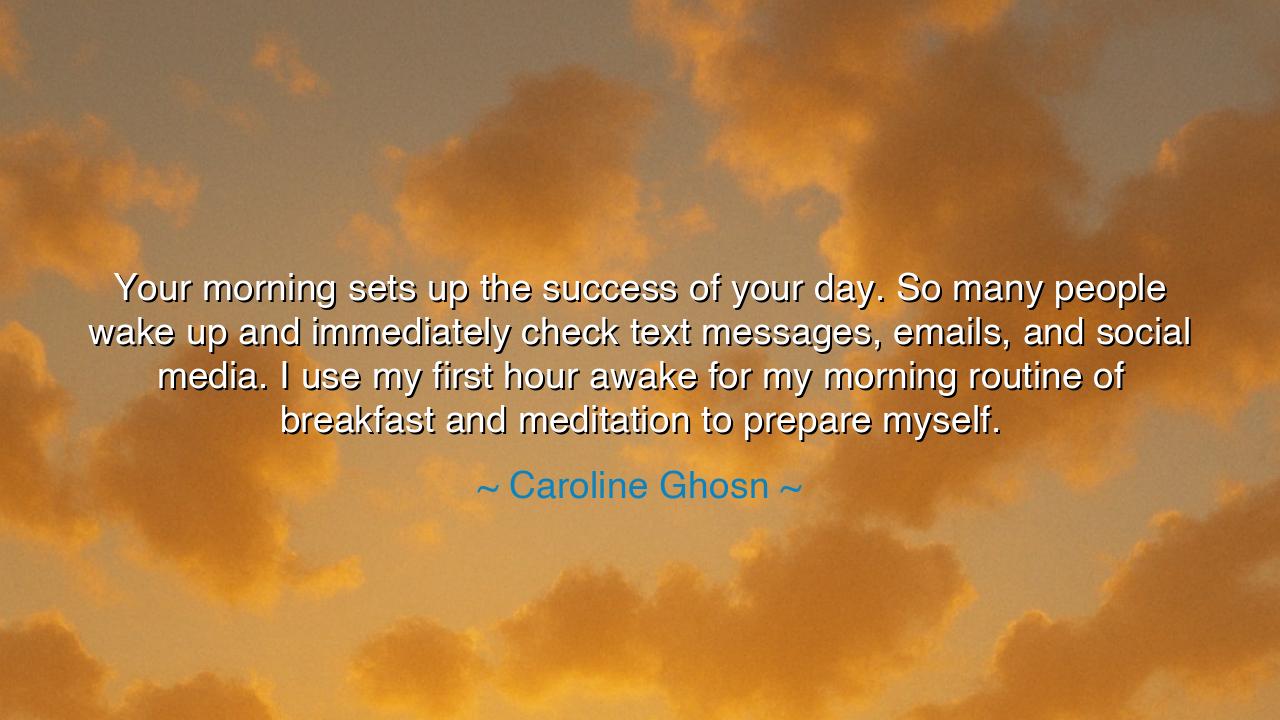
Your morning sets up the success of your day. So many people
Your morning sets up the success of your day. So many people wake up and immediately check text messages, emails, and social media. I use my first hour awake for my morning routine of breakfast and meditation to prepare myself.






Hear now the words of Caroline Ghosn, whose wisdom speaks like the rising of the sun: “Your morning sets up the success of your day. So many people wake up and immediately check text messages, emails, and social media. I use my first hour awake for my morning routine of breakfast and meditation to prepare myself.” These words are not simple counsel about food or ritual; they are a summons to guard the sacred beginning of each day, for from the first moments flows the current of all that follows. As dawn opens its gates, the soul chooses: to be captive to noise and distraction, or to rise with calm strength toward purpose.
The meaning is profound. When a person awakens, their mind is unshaped clay, soft and impressionable. To seize a device, to scroll through the endless chatter of messages and social media, is to give away the sculptor’s hand to others. It is to allow the world to write upon the still-quiet heart before one has written one’s own command. But to claim that first hour, to eat with presence, to breathe in stillness, to meditate upon what truly matters—that is to set the keel of the ship aright before it sails into the storm of the day.
The origin of such wisdom lies in the oldest traditions. The sages of India spoke of Brahma Muhurta, the hour before sunrise, as the holiest time for reflection and discipline. Roman generals, too, rose at dawn to strengthen their bodies and steel their minds before addressing affairs of empire. From East to West, the ancients knew this truth: the morning routine is no mere habit, but the forging of the self in the fire of first light. Caroline’s words stand within this lineage, echoing the voices of those who learned long ago that victory begins not in the battlefield, but in the dawn.
Consider the example of Benjamin Franklin, that architect of industry and wisdom. Each morning he asked himself: “What good shall I do today?” This single question, asked in silence at daybreak, directed his hours and gave shape to his life. He did not rise to be enslaved by the clamor of others’ demands, but to anchor himself in principle before entering the noise of the world. Like Franklin, like the sages, Ghosn declares that the morning is the anvil upon which the day is hammered into form.
The lesson is clear: if you surrender the first hour of your waking life, you surrender the crown of the day. But if you guard it fiercely, you enter your tasks as a sovereign enters battle—centered, nourished, and prepared. This is not about rejecting the world, but about preparing yourself to meet it with strength, rather than weakness. The meal, the breath, the stillness—these are not indulgences, but armor.
Practical actions must therefore follow. When you rise, do not reach for the glowing screen. Instead, breathe deeply. Drink water, as the earth drinks the dew. Feed your body with simple nourishment, and feed your spirit with silence, prayer, or meditation. Let your thoughts dwell not on the burdens waiting in the inbox, but on the guiding purpose of your life. Only then, after the hour of sanctity, open yourself to the world’s demands. In this way, you rule the day, rather than being ruled by it.
And so, child of tomorrow, remember: the morning is your foundation. Lay it well, and the walls of your day will stand unshaken. Neglect it, and the winds of distraction will scatter your efforts like dust. As the ancients carved their destinies by the rising sun, so too must you. Claim your morning. Guard it as a treasure. Begin with purpose, and the whole day will bend toward your will.






AAdministratorAdministrator
Welcome, honored guests. Please leave a comment, we will respond soon